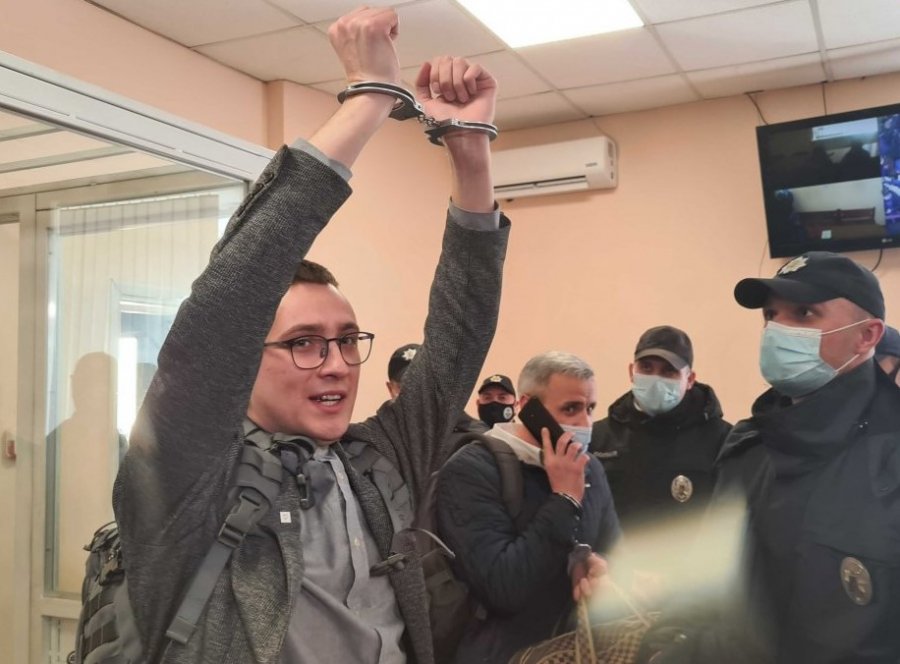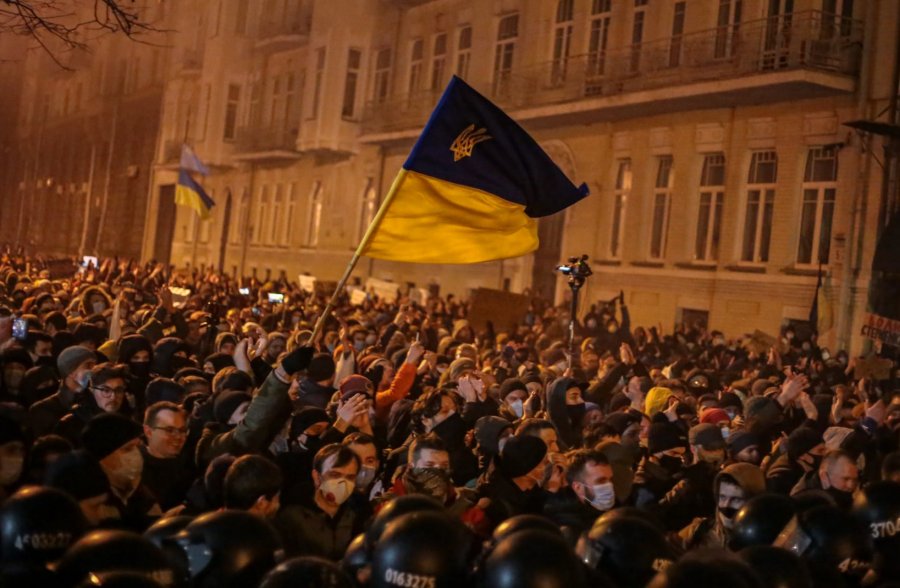Protests throughout Ukraine following 7-year sentence against civic activist Serhiy Sternenko

Everything about the trial of Odesa civic activist Serhiy Sternenko and the seven-year sentence passed on 23 February arouses concern and it is not surprising that former Kremlin hostages, human rights defenders and prominent civic activists have all been vocal in their condemnation. Comments from the Ukrainian Helsinki Human Rights Union [UHHRU] called the case “dubious”, and pointed to the fact that three potentially fatal attacks against the civic activist had never been properly investigated. This trial, under a judge who has received very unfavourable assessments from groups advocating for judicial reform, comes six months after the highly contentious decision to bring charges of murder against Sternenko over the last of the three attacks, in which one of his assailants was killed. The sentence on 23 February will certainly be appealed, however Sternenko and his co-defendant, Ruslan Demchuk, were both taken into custody in the courtroom.
Sternenko, who will shortly turn 26, played an active part in Euromaidan and then in the tragic disturbances in Odesa on 2 May 2014, initially provoked by a pro-Russian organization receiving funding from Moscow. At the time of the abduction and attack on a pro-Russian deputy in 2015, he was the head of the Odesa branch of the ultra-nationalist and right-wing Right Sector movement which has been involved in a number of very controversial protests, including some of questionable legality. Later, Sternenko headed an NGO called «Небайдужі» (“Not Indifferent”). He has repeatedly come into conflict with the Odesa authorities through his opposition to illegal construction, dodgy land deals in the city and local corruption.
‘Abduction’ trial
Criminal charges were initially laid against Sternenko in September 2015 over the alleged attack on and abduction of Serhiy Shcherbych, an Odesa local deputy and former head of a branch of the Rodina party, on 24 April 2015. An attempt to remand him in custody then was overturned by an appeal court, and Sternenko had since been under bail over the charges.
It was this case that came to court in early 2021, with judge Viktor Poprevych from the Prymorsky District Court in Odesa sentencing both Sternenko and Demchuk to seven years and three months’ imprisonment and confiscation of half of their possessions. They were both found guilty of robbery with violence (Article 187 of Ukraine’s Criminal Code), abduction (Article 146 § 2) and of unlawful use of a weapon (Article 263 § 1). Criminal liability was, however, waived on the original abduction charge due to a time bar.
This is a very long sentence, especially given that one of the charges was time-barred. In his message of support to Sternenko immediately after the sentence was announced, Viktor Handziuk, father of the slain Kherson activist Kateryna Handziuk, pointed out that the sentence was higher than those passed on the men who carried out the fatal sulphuric acid attack on his daughter.
The prosecution asserted that the motive for the abduction had been the intention to steal Shcherbych’s bank card and mobile phone, with the fact that he had been a deputy treated as an aggravating circumstance. This differs significantly from the report issued at the time, at least according to the Odesa-based Dumskaya portal which cites the Odesa regional police as their source. According to this version, Shcherbych himself reported that he had been abducted, beaten and shot at three times with a shock pistol. His assailants were said to have demanded that he resign from his deputy post. Dumskaya reported also that Shcherbych was believed to have taken paid thugs to Kyiv at the beginning of 2014, in order to support the regime of Viktor Yanukovych (during the Maidan protests).
Both Sternenko and Demchuk deny any part in the abduction of Shcherbych. Sternenko calls his prosecution politically motivated and believes that the police have fabricated the case on the commissioning of Odesa Mayor Hennady Trukhanov. Sternenko asserts that during the search of his home back in September 2015, a blank pistol was removed. This was one of the issues that was disputed during the trial, with one expert having asserted that the weapon in question was a start gun, not a firearm. Poprevych, however, accepted the original expert’s assessment, that this was a start gun, that could easily be changed into a firearm. It should be said that this was noted in a commentary on both the sentence and the protests by Odesa lawyer Yulia Lisova, who clearly believes that much of the protest has been based on people over-heating, without examining the facts.
In their commentary, UHHRU asserted that there were other irregularities which Poprevych had ignored. These included the fact that the court had accepted the evidence of a witness who was never questioned in court, as well as that the original search took place without a lawyer being present and without Sternenko even being allowed to contact this lawyer.
Judge Poprevych
Among the many civic activists who condemned the sentences on 23 February were Mykhailo Zhernakov from the DEJURE Foundation and others campaigning for judicial reform in Ukraine. Many pointed to monitoring of different candidates applying for Supreme Court posts in 2017 and, specifically, the highly negative opinion given then of Poprevych at ProSud. This stated that there had been plenty of dubious rulings during his period as a judge in Donetsk (before his transfer to Odesa in 2015), but also posted photographs of the busts of Vladimir Lenin and Soviet dictator and mass murder Joseph Stalin, which Poprevych had placed outside his home in 2009. The same report points to real estate and other property, hardly commensurate with the income of a Ukrainian judge, which the latter “had forgotten to declare”. The DEJURE Foundation mentions two very recent eyebrow-raising rulings. In one, Poprevych insisted on releasing the director of the Viktoria Children’s Camp in which three children died in a fire after violations of building regulations. This was despite the prosecutor’s argument that he would try to influence witnesses if released. The other example is of a disciplinary prosecution he terminated, despite plenty of evidence that the person had been driving while intoxicated. The above has no direct relation to the case in question, but has certainly compounded many observers’ concerns about this belated trial and extremely long sentence.

Protest on 23 February in Kyiv against the sentence passed on Serhiy Sternenko Photo Graty
Murder charges
Although Sternenko himself points to Trukhanov as being behind what he calls this politically motivated sentence, others view it as part of worrying criminal proceedings against the civic activist under Prosecutor General Iryna Venediktova. Zhernakov calls it “a special operation by the enemy” and points to propaganda efforts aimed at presenting Sternenko as a killer by the three pro-Russian channels associated with Viktor Medvedchuk, the controversial Ukrainian MP and associate of Russian Vladimir Putin. Given the lack of progress in critical prosecutions, over Maidan crimes, attacks on civic activists (including Sternenko), it is worrying that two prominent Maidan activists – Sternenko and Tetyana Chornovol – have both become the target of very dubious prosecutions. Zhernakov is not alone in assuming that a role in trying to prosecute Maidan activists and discredit Maidan is being played by former Yanukovych aide, Andriy Portnov.
The Ukrainian Helsinki Human Rights Union (which is made up of over 30 Ukrainian NGOs) is representing Sternenko’s interests with respect to the three serious attacks on him in 2018. They and other civic activists believe the proceedings against Sternenko over the death of one of his assailants to be politically motivated.
According to Dzerkalo Tyzhnya, the attacks on Sternenko came after he took part in protests against the destruction by the local authorities of the Summer Theatre and after he organized a series of protests against Russian cultural expansion in Odesa.
On 7 February 2018, two assailants pulled open the door of the car he was driving in and began beating him with a baseball bat with inserted blades. He received concussion and a thigh wound. Neither the assailants, nor those who commissioned the attack have ever been identified.
On 1 May 2018, he was shot in the neck twice with rubber bullets. Sternenko managed to catch the assailant and hand him over to the police. The attacker proved to be a former police officer from Kazakhstan, who refused to cooperate with the investigators, and to say who had paid him.
Although he had faced two potentially fatal attacks in a short space of time, Sternenko’s application for protection was rejected. Due to ongoing criminal investigations which both he and a number of NGOs viewed as politically motivated, Sternenko was not allowed to carry a weapon.
On 24 May 2018, he was near his home, with his girlfriend, when two men attacked him and delivered several knife injuries. He received concussion, a deep cut to the hand and other lacerations. Ivan Kuznetsov, one of the two assailants, however, later died of a knife wound.
Details of the conflicting accounts of what happened during that attack can be found here. Sternenko has always maintained that he acted in self-defence.
In October 2019, former Prosecutor General Ruslan Riaboshapka appointed Viktor Trepak Deputy Prosecutor General and put him in charge over the investigation into Katya Handziuk’s murder, the killings and other crimes against Maidan activists; and the ‘Sternenko case’ (over the death of his assailant). He very soon earned the respect and trust of lawyers representing Maidan victims; Viktor Handziuk and civic groups. All were appalled when one of Iryna Venediktova’s actions after becoming Prosecutor General was to take this role away from Trepak, leaving him no option, he said, but to resign. In an interview soon afterwards, Trepak said that he had come into “serious conflict” with Venediktova over the Sternenko 2018 case. The conflict, he said, had arisen because “Venediktova expressed huge interest in this case and in her first conversation with me said that Sternenko needed to be immediately informed that he is under suspicion”. He was baffled as to how anybody could speak of suspicion without having studied the case, and added that, based on the material of the case, there were no grounds for talking of any charges. There were important aspects of the attack and defence, he added, that remain unexplained, and a comprehensive expert assessment has been ordered because the two previous assessments gave contradictory opinions. Trepak told Venediktova that, without such an assessment having been made, it was legal nonsense to tell anybody that they are under suspicion. “The Prosecutor General was extremely unhappy with my position”, he noted.
After this meeting, Trepak summoned the management of the relevant department, and they again thoroughly examined the case material. “The conclusion was unanimous and unequivocal – according to the material of the case there are no grounds for informing Sternenko that he is suspected of any crime.” Venediktova was sent a report, signed by all those involved in the investigation, demonstrating the lack of any grounds for charges against Sternenko.
This did not stop Venediktova recently reporting a meeting with high-level representatives of the Interior Ministry and stated that they were agreeing “investigative and procedural activities” in various high-profile cases including what she called “the killing of Kuznetsov”. On 7 April 2020, in an interview to Ukrainska Pravda, Venediktova confirmed that Sternenko would face charges, with the only question being what these are (murder or killing in self-defence). In August 2020, Sternenko was formally charged with murdering the assailant who may well have been planning to kill him. .
The above are just a summary of the reasons why very large protests took place in Kyiv and a number of other cities in Ukraine on Tuesday evening, following the court ruling.





